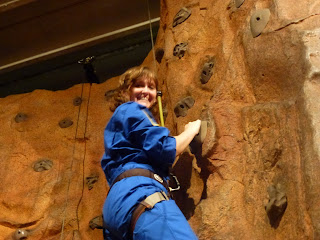Day 2
Shuttle Mission Day
Began the day with a some group physical
challenges. Within our groups we had to
work out how to get across the Nile without getting our feet wet – the problem
is that there were seven of us, with three planks of wood and only 10 blocks
randomly placed in the river (Okay, it wasn’t really the Nile, just an area
sectioned out! But it was really hard – our winning team was the fastest to
ever cross!)
Professor Jay Graham gave an uplifting
presentation about the different types of fuel used for specific parts of the
shuttle flight. This was followed by a run down of how rockets actually work,
including the different sections of the shuttle.
In the afternoon we went to the U.S. Space
and Rocket Center Museum. This was full of interesting facts and information. I
squeezed into a capsule, which was actually bigger than that used by Alan
Shepard in 1961, who was the first American to reach outer space! He was beaten
in the race to be the first human to reach outer space by Russian Cosmonaut
Yuri Gagarin by only 4 weeks. Did you know that these space journeys have
helped us in our own lives? Such as GPS, and even Disposable nappies!(You will
have to ask me another time the connection to the nappies!)
After a quick trip to Mars in a simulator
I rock climbed a wall and abseiled back down!
Then it was time for the Shuttle mission!
Decked out in my space suit – I travelled into space to complete our mission.
With great team work and communication we completed our task and returned
safely back to Earth.




From Lienna: your pictures really bring things into focus. Not much space in that top section... and all that fuel underneath! The space program also provided for the invention of Teflon, so we have non-stick pans.
ReplyDeleteAs well as WD40, and Disposable Nappies, thanks to Alan Shepard - who actually had a wee accident in his capsule (Pardon the pun!), so NASA had to solve that small problem. Other things that have been invented due to the Space program include Artificial hearts, Memory foam, velcro, anti-corrosion coating, and Cochlear Implants to name just a few. These engineers were truly amazing - and working in NASA did not mean that their work just benefited the space program, but us everyday folk too!
ReplyDelete